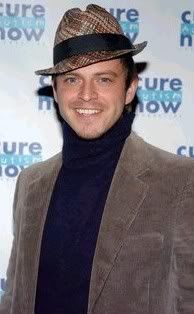Ok the translation of the other interview is here, sorry for my english, I have problems with prepostions and phrasal verbs.
On the verge of finalizing his respective seasons' 05, Carmine Giovinazzo (CSI New York) and Adam Rodriguez (CSI Miami) tell how they take ahead the scripts in which the scientific terms sometimes confuse even them. This is one of the TV series with more audience in the United States.
CSI is an atypical case for the TV, if non unique. It’s also surprising. It is not very common that from a TV series, in this case CSI Las Vegas, two versions with same thematic about forensic police but in different contexts are released.
To the original CSI, created in 2000 and framed in the city-casino of Las Vegas, they later followed CSI Miami (2002) and CSI New York (2003), both series maintaining a quality in scripts and admirable stories - similar, but different. This data would be enough to understand the importance that has the TV franchise created by Jerry Bruckheimer, whose three versions are broadcast by Sony.
CSI, in anyone of their versions, is a program that attracts any type of spectators, as a result of a consistent script, a solid cast and an agile story thanks to its cinematographic style.
The first aspect to point out is that CSI is a franchise that introduces us in the operation of a police team. Up to here, nothing different from what we are used to seeing in other TV series. But CSI instead of becoming jumbled in the daily routine of street police, focuses its attention on forensic police, closer to the scientific customs that to the police ones. In addition, in any of the versions appears a heroic detective able to solve any case by his own account. Here, the resolution of the cases does not respond to the intuition nor to the investigation of an only police, but rather to the study of the totality of the variables at the time of investigating a crime.
On the occasion of the end of season of the series (the first season of CSI NY finalizes today, whereas CSI Las Vegas does the next Wednesday to the same hour), Página/12 interviewed two of the actors who put the body and intelligence to solve the chilling and strange crimes. Carmine Giovinazzo, which in CSI NY plays the tough and conflicting Danny Messer, and Adam Rodriguez, whom in CSI Miami incarnates the Cuban-American Eric Delko. They told us the secrets of a franchise that does not know geographic nor cultural borders.
- How did you prepared to play a forensic police?
Adam Rodriguez: - We dedicated a prudent time to study everything related to forensic science; we had to learn what they do because their task is not very well-known by the public. We put ourselves in contact with this people, in both the forensic laboratory and in the morgue. It was an arduous process, because the task they carry out is complex. But we learned enough to make it credible.
Carmine Giovinazzo: - The fact that my father and my sister were police officers, and growing up surrounded by everything that is related with police, I think that it influenced the way I play my character. It has given me the knowledge of how police officers act, what kind of people are, that it’s almost innate.
- What did surprise you more of that profession?
A.R.: - The thing that surprised me is the patience of forensic doctors. We solve the crimes in 45 minutes, but it costs them much more time. In reality, forensic scientist must always focus their attention during a very long period to arrive at the truth. It is a very interesting, but also very stressful profession.
- What was the most complex aspect of play a forensic doctor?
C.G.: - A lot of what we discuss in the show is how turning this dense information of the script into an interesting episode, to catch the audience. The truth is that we often handle a degree of scientific information that it is almost impossible to understand. Sometimes, I read the script with all that scientific language and then, I have to ask in the set what the script is about to be able to understand what I am saying. For an actor It’s very complicated to turn a complex dialogue into something attractive.
- Apart from the cities where the plots are filmed, what differences do you find between CSI Miami and CSI NY?
A.R.: - I believe that CSI Miami always leaves a moral at the end. That has a lot to do with the character of David Caruso, because he is an infallible and incorruptible person. He always does the right thing, so the show gives life lessons. It has a higher moral level. I think that the other two main characters of CSI NY and Las Vegas are more humans.
C.G.: - My answer is a little more boring. The fact that there are other actors, other characters and other stories cause that each one is a different product. Although, I must say that all of them have in common the resolution of the crimes through scientific investigation.
- The series has been a success both in EE.UU and outside. It goes beyond cultural barriers, even maintaining a deep root to the idiosyncrasy of the inhabitants of the cities where the plots take place. So why do you think that happens?
C.G.: - If I knew it I would not be here, I would be making my own TV series or films (laughter). I think that CSI has the virtue of being an integral show, in the sense that each character has an interesting story behind. In the show, apart from solving the case, there are also personal stories and relationships between the characters.
A.R.: - I think that people with this new type of shows can explore a range of different characters, which makes the series richer. It is a way of not centralizing everything in a single person. In real life, the police work does not rest on the heroes that TV and films sold us for a long time, but in a team work. Being faithful to that aspect makes the cycle richer, because it is impossible that actually a single person could do everything.
- Adam, It always happens something bad to your character in the series, do you think this affects the way the audience could identify with your character?
A.R.: - (Laughter.) I don’t know why they chose me to be the laughing stock of all. And the truth is that, being the only Latin of the show, it bothered me that all the ambiguities fall on my character. I spoke with the scriptwriters and they made some adjustments. Later I understood that often it’s more interesting to be mistaken than to be always right. The perfect policemen do not exist. Like human beings, we commit many errors and people are more identified with the ones that commit errors than with the ones that are always right.
- You say that because you are the only Latin character, bad things always happen to you. Did you feel some kind of discrimination from American industry of entertainment against Latins?
A.R.: - I think that yes, there is a difference between the native ones and the Latins. It seems that not only it’s because a cultural question, but also that in EE.UU there aren’t enough Latin scriptwriters or directors that can express our point of view. The Latin point of view that Hollywood transmits is based on the view of someone non Latin. That is the struggle that I always have in the set, where I have to make understand my point of view, that it’s different from theirs. At the present time, the acceptance of black people is bigger, but they had to fight a lot to make it happen. I do not believe that it is casual that almost no main character is played by a Latin.


